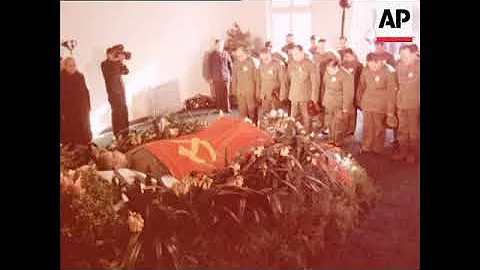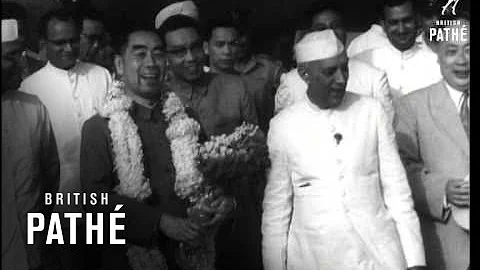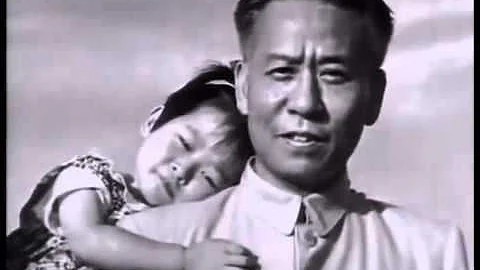Important discussion
July 15, 1934
Chairman of the Provisional Central Government of the Chinese Soviet Republic Mao Zedong, Vice Chairman Xiang Ying, Zhang Guotao; Chairman of the Revolutionary Military Committee of the Chinese Workers' and Peasants' Red Army Zhu De, Vice Chairman Zhou Enlai, Wang Jiaxiang and others jointly published "For the Chinese Workers' and Peasants' Red Army to Go Northward" Declaration of Anti-Japanese War. The declaration stated that in order to directly fight Japanese imperialism, the Soviet government and the Workers' and Peasants' Red Army would spare no effort to fight against the Kuomintang army's "encirclement and suppression" at the critical juncture and send the anti-Japanese advance team northward to fight against Japan with the greatest determination. At the same time, five anti-Japanese propositions were put forward: (1) Resolutely oppose the Kuomintang government's selling of territorial sovereignty, oppose "direct negotiations between China and Japan", and oppose the recognition of the Puppet Manchukuo; (2) immediately declare the severance of diplomatic relations with Japan and declare all Sino-Japanese secret treaties and agreements invalid , mobilize the entire Chinese navy, land and air force to fight against Japan, immediately stop attacking and blockading the Soviet areas, so that the Workers' and Peasants' Red Army can be fully used to fight Japanese imperialism directly; (3) arm the people of the country, organize volunteer armies and guerrillas directly participated in the Anti-Japanese War, and actively assisted the Northeast Volunteer Army and the Workers' and Peasants' Red Army's advance team to go north to fight against Japan; (4) confiscated all property of Japanese imperialists and traitors, and stopped paying the principal and interest of all national debts; (5) generally Organize people's anti-Japanese groups.
July 15, 1937
The "Central Committee of the Communist Party of China to Promulgate the Declaration of Cooperation between the Kuomintang and the Communist Party" drafted by Zhou Enlai on July 4th was sent to Chiang Kai-shek today. The declaration stated: When this national crisis extremely seriously threatens the survival of the nation, in order to save the motherland, we hope to quickly launch a national war of resistance, strive for the independence, freedom and liberation of the Chinese nation, and implement civil rights politics. At the same time, we solemnly declare to the whole country that we are willing to fight for the complete realization of Dr. Sun Yat-sen's Three People's Principles ; cancel all insurrectionary policies to overthrow the Kuomintang regime, and the redization movement, stop the policy of violent confiscation of landlords' land; abolish the current Soviet government, and implement civil rights Politics, in order to unify the national political power; cancel the name and designation of the Red Army , and reorganize it into the National Revolutionary Army, which is under the jurisdiction of the Military Commission of the National Government and is ready to be dispatched to assume the responsibilities of the Anti-Japanese Frontline. This declaration was not published until September 22 by the Kuomintang Central News Agency. This declaration is included in the first volume of "Selected Works of Zhou Enlai".
On July 15, 1944,
, Mao Zedong called Li Xiannian and various bureaus and sub-bureaus of the Central Committee of the Communist Party of China. The telegram reported the current situation and pointed out: (1) The Kuomintang troops were severely defeated in the battles in Henan and Hunan. (2) The number of troops directly surrounding the Shaanxi-Gansu-Ningxia Border Region by the Kuomintang government has not been reduced, and the blockade still exists. (3) British, American, and Soviet journalists have been in the border area for more than a month, and their news reports from Britain, the United States, and the Soviet Union are beneficial to us. (4) There has been no progress in the negotiations between the Kuomintang and the Communist Party. In fact, our party still does not recognize its legal status. Regarding the army, it only recognizes our ten divisions or 100,000 people. Regarding the government, it only recognizes one area in the Shaanxi-Gansu-Ningxia Border Region. Other things proposed by our party None of the requests were granted. To fundamentally adjust the relationship between the Kuomintang and the Communist Party, there is no hope until Chiang becomes more difficult and the United States exerts greater pressure. (5) The political, military, economic, and cultural institutions of the Kuomintang are extremely corrupt and brewing a great crisis. (6) Our party has made new developments in the three battlefields behind enemy lines in North China, Central China, and South China in recent months. It has eliminated many enemy and puppet troops and regained much land. In front of the people, the difference between the battlefield behind enemy lines led by our party and the frontal battlefield led by the Kuomintang has become increasingly obvious. One is attacking, developing, and consolidating; the other is retreating, shrinking, and full of crises. However, our party still faces many difficulties. The Japanese army will launch a brutal attack on us. The economic difficulties are still huge. We must not be careless or lose vigilance. This telegram is included in the third volume of "Collected Works of Mao Zedong".
July 15, 1985
Deng Xiaoping met with Prime Minister Chambers of Trinidad and Tobago. When talking about China's reform and opening up policy, he pointed out: Our opening up policy, a series of policies and the comprehensive economic system we have established. Reform is an experiment. Without reform and an open policy, it will be impossible to achieve our development strategic goals. This is a test, and this test must be passed. The open policy and economic reform must be adhered to to the end and will not change. If there is a change, there will be no way out. The outcome of any such thing is nothing more than two, one success and one failure. We believe it will be successful. There will definitely be twists and turns in the process, and you may even make mistakes, big or small. That doesn't matter. If you make a mistake, correct it. If this method fails, try another method. In short, experience and lessons must be summarized in a timely and frequent manner.
July 15, 2014
Xi Jinping attended the sixth meeting of BRICS leaders and delivered a speech, emphasizing the development of a closer, more comprehensive and stronger partnership among BRICS countries. When discussing the issue of political coordination, he pointed out that the BRICS countries should not only serve as anchors for world economic stability, but also serve as shields for international peace, integrate their own development with world peace and stability, and serve as defenders of world peace and global security. Promoters and builders of the international security order will jointly combat terrorism and maintain network security as key areas of cooperation, advocate a new security concept, and jointly maintain the international security cooperation system with the United Nations as the core. When talking about the issues of sustainable development and inclusive growth, he emphasized the need to consolidate the strong development momentum of the BRICS countries and strengthen confidence in the economic prospects of the BRICS countries. We must adjust the economic structure, achieve higher-quality development, establish closer economic partnerships, promote the construction of an open world economy , and build a global development partnership. The meeting decided to establish a BRICS Development Bank with its headquarters in Shanghai and establish a BRICS emergency reserve arrangement.
July 15-16, 2019
When Xi Jinping inspected Inner Mongolia and guided the development of the theme education of " Don't forget your original intention , Keep your mission in mind", he pointed out that all regions and departments should pay attention to "four things in place" when carrying out the theme education. : First, grasp the ideological awareness, integrate learning throughout, continuously deepen the understanding of the significance of thematic education, deepen the understanding of the party's original intention and mission, and deepen the understanding of the risks and tests faced by the party. You cannot engage in formalism in learning, and you cannot rush for success. You must make new progress and new experiences every time, and accumulate them day by day. It is necessary to strengthen learning based on reality, deepen the understanding of the importance of ecological civilization construction, deepen the understanding of the Party Central Committee's strategic positioning of Inner Mongolia, and deepen the understanding of one's own responsibilities. The second is to inspect the problem in place, carry out in-depth investigation and research, pinpoint the problem, dig deep into the root cause, and clarify the direction of efforts and improvement measures. The third is to ensure that rectifications are implemented and the right medicine is prescribed. The systems and mechanisms that should be improved must be improved, the loopholes that should be plugged must be plugged, those that should be criticized must be seriously criticized, and those that should be dealt with must be dealt with seriously. The effectiveness of solving actual problems must be used as the criterion. When problems are discovered, they must be immediately rectified. There must be no delay or falsification. The fourth is to ensure that organizational leadership is in place. The main leading comrades should take the lead in learning, investigating and researching, examining problems, taking the lead in rectification and implementation, and playing an exemplary role. It is necessary to align with the arrangements and deployments of the Party Central Committee, and at the same time, it is necessary to integrate reality and enrich methods and methods. There are many laws and regulations within the party, but the main problem lies in their ineffective implementation. Some lack the ability to implement, and some lack the confidence to implement. We must strengthen the implementation of laws and regulations without discounting them.
He also pointed out that to build a moderately prosperous society in an all-round way, no nation can be missing; to achieve the great rejuvenation of the Chinese nation, no nation can be missing. The Communist Party must do what it says it will do, and it will definitely be able to do it. The system of regional ethnic autonomy is my country's basic political system. We must carefully summarize the theory and practical experience of regional ethnic autonomy, adhere to and improve this system, promote ethnic unity and integration, and promote all ethnic groups to embrace each other like pomegranate seeds. Together.
Party History Review
1927
On July 15, Wang Jingwei held an enlarged meeting of the Central Standing Committee of the Kuomintang. In the name of "dividing the Communist Party", he formally broke with the Communist Party and carried out mass arrests and massacres of Communist Party members and revolutionary masses. The cooperation between the Kuomintang and the Communist Party completely collapsed, and the great revolution launched by the cooperation between the Kuomintang and the Communist Party failed. According to incomplete statistics, from March 1927 to the first half of 1928, more than 310,000 Communist Party members and revolutionary masses were killed.
1979
On July 15, the Central Committee of the Communist Party of China and the State Council approved the two reports of the Guangdong Provincial Committee and the Fujian Provincial Committee on the implementation of special policies and flexible measures for foreign economic activities, and decided to pilot export special zones in Shenzhen and Zhuhai first. On May 16, 1980, the Central Committee of the Communist Party of China and the State Council approved the "Minutes of the Meeting of Guangdong and Fujian Provinces" and officially renamed the export zone a special economic zone. In August, the 15th meeting of the Standing Committee of the Fifth National People's Congress approved the establishment of special economic zones in Shenzhen, Zhuhai, Shantou and Xiamen by Guangdong and Fujian provinces. Driven by the central government's decision-making, the builders of the special zones have created the special zone spirit of daring to venture, experiment, be the first, and work hard.
1993
On July 15, the State Education Commission issued "Several Opinions on the Construction of a Group of Higher Education Institutions and Key Subject Points", proposing a plan to focus on the construction of about 100 higher education institutions and a group of key subject points for the 21st century, referred to as "211 project ". In May 1998, Jiang Zemin proposed that my country should have a number of world-leading first-class universities. In January 1999, the State Council approved the Ministry of Education's "Education Revitalization Action Plan for the 21st Century", proposing to create a number of world-leading first-class universities and a number of first-class disciplines, referred to as the "985 Project."
2014
On July 15, the sixth meeting of BRICS leaders was held in , Brazil. It was decided to establish a New Development Bank and headquarter it in Shanghai, China, and establish a BRICS emergency reserve arrangement.
Historical moment

On July 15, 1933, Liu Shaoqi published two articles, "Stop "Forced Introduction" and Relief for Unemployed Workers" and "Model Workers' Demand Program" in the third issue of the "Soviet Area Workers" newspaper.
[A Hundred Years of Party History·Read Every Day] Executive Editor: Lu Jia Reviewer: Guo Weiwei Instructor: Ban Yongjie

A Hundred Years of Party History·Read Every Day
Source: Central Party History and Documentation Research Institute website, Communist Party Member Network





















